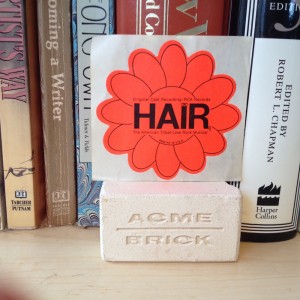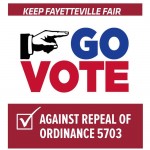This “119” fight in my hometown could’ve just offended me like the reasonable person I think I am. But it enrages, rekindling a pair of memories. While I support full nondiscrimination in my community and country, when proposed this summer Fayetteville Ordinance 5703 / Chapter 119 Civil Rights Administration fell shy. Surely I could retain egalitarian credentials and oppose a law that might damage its goal of extending civil rights to matters of sex, not just gender.

Then its opponents begin showering shrapnel of fearmongering on my Northwest Arkansas city. That probably stops this week.
Still, the City Council passed “119” in a 6-2 vote following a 10-hour meeting that began Aug. 20. The foes’ petition drive set up a repeal vote Dec. 9, for which early voting ends Monday afternoon.
Voting “against” means against repeal and thus supporting the new Chapter 119 ordinance.
The forces for repeal continue its Atwater/Rove-inspired campaign. First, to reminisce.
The senior Ben Pollock’s main hobby was theater. Beginning in the mid-1950s, he was active backstage in Fort Smith Little Theatre, a community theater organization. That overlapped with years on the board of the Broadway Theater League of Fort Smith, which staged commercial “bus-and-truck” musicals and plays at what is now the ArcBest Corporation Performing Arts Center. For the league, Dad booked the shows. He parlayed that self-taught skill to a year or so working as the municipal auditorium’s manager.
The Broadway League discussed touring companies of New York’s hot Hair and Jesus Christ Superstar. The former was late 1971 or early ’72 (making me 14 or 15) with the latter the next year. Its board chose not to stage them, but Dad, already having communicated with their production companies, decided to do so on his own, contracting the auditorium, arranging box office and so forth.
Hair was famous for its free love, pro-recreational drug and anti-war messages. The nude scene in particular aroused aginners. (The cast is revealed as naked in the closing bars of “Where Do I Go,” which ends Act I.)
While songs from Superstar now can be heard in even conservative church services, at the time angry evangelical Christians called the rock opera heresy.
Opposition brought the shows, separately, to the Fort Smith Board of Directors, bringing supporters in packed church buses. The local newspaper interviewed Dad. Our phone was listed, and we got a few crank calls.
My eighth-grade English teacher had us give several speeches through the term, and I explained Hair in one. I handed out palm-sized stickers with the Hair logo of the time to classmates. One buddy tore it up inches from my face. (Our friendship eventually renewed.)

Hair did not come to Fort Smith. I don’t know if Dad canceled the contract from official pressure or indirect. He can’t tell me. He died 29 years ago this Dec. 19. Mom passed in 2004.
Dad did get Superstar to Fort Smith. I saw it: It was more of a staged reading with the band members as the cast. I don’t recall if the auditorium sold out. Church buses brought in protesters, and I recall the pickets in the night, outside the building.
I cannot extrapolate where Dad would stand on Fayetteville’s 119. Sexuality talk made him uncomfortable. There were two gay men in his circles (that I know of) whom he liked and admired, but gosh he was a man of his geography and generation so the topic was skirted. Before his and his brother’s Model Laundry closed in 1967 he emphatically did not discriminate on age, race, gender or disability in hiring.
Maybe Ben Pollock Sr. grew some Atticus Finch in ’71-72. Yet I know full well that this set of memories is puny when the topic is housing, employment or other economic discrimination.
Yet the implication of mob rule, set in sanctified language, burned a hole in this Scout.
Click to Read PDF of Ordinance

I now support Fayetteville’s civil rights ordinance because many laws don’t start out immaculately phrased. That’s what keeps Congress and lower legislative bodies in business. Lest we forget.
The other reason was learning in August of the U.S. Supreme Court’s Loving ruling.
When did SCOTUS literally address loving?
The plaintiffs were Loving, Richard and Mildred, white and black, respectively, suing Virginia. The Lovings were arrested in 1958 for violating the state’s ban on interracial marriage. Miscegenation was the word. In 1967, the highest court in the land ruled in the couple’s favor, unanimously.
Intermarried couples remain rare, but one sees them around. In the era of the passage of the Civil Rights Act, the Loving case was on time.
It is taking marriage between homosexuals another half-century to near its Loving. This year, the justices seem to be heading that way.
Fayetteville’s Chapter 119 is not about matrimony but the creation of a means to hear discrimination complaints on a municipal level for the usual race, age, disability and religion differences, the less controversial marital status and familial status and, last, to gender identity, gender expression and sexual orientation. The online Fayetteville Flier has a backgrounder on the law.
• Days before the fateful August council meeting, its opposition sent out a robocall from “reality” TV star Michelle Duggar, who lives near Fayetteville, claiming marauding bands of perverts will invade the wrong bathrooms. This made The Washington Post.
• Local TV had the story last week that the opponents of 119 bought a website domain name that would’ve been used by its supporters’ organization Keep Fayetteville Fair, redirecting to its own Internet site.
• The Fayetteville Chamber of Commerce endorses the repeal. This is no surprise. Chambers nationwide are conservative bodies dedicated to their dues payers: “The Fayetteville Chamber mission is to serve as the leader and advocate for our membership to promote a strong business climate and facilitate positive community interaction for continued economic development and enhance quality of life.”
• Both sides have applied to the county to have poll watchers. Only pro-repealers have deployed them at the courthouse during early voting. They have not made any claims to have observed voter fraud. (With 20 forms of ID, blood test, fingerprints, retina scan and campaign-sticker shearing required, how could there be any bad ballots?)
State law however, allows them to stand only six feet from voting booths. That could intimidate cautious voters.
“Don’t be a sheep,” Mom always told me. Dad showed it. Scout’s honor.
— Copyright 2014, Ben S. Pollock Jr.

One reply on “Ends Do Not Justify Mean”
Complete but uncertified election results:
For repeal of ordinance: 7,523, 51.66 percent
Against repeal of ordinance: 7,040, 48.34 percent
A 483 vote difference, 29.40 percent voter turnout